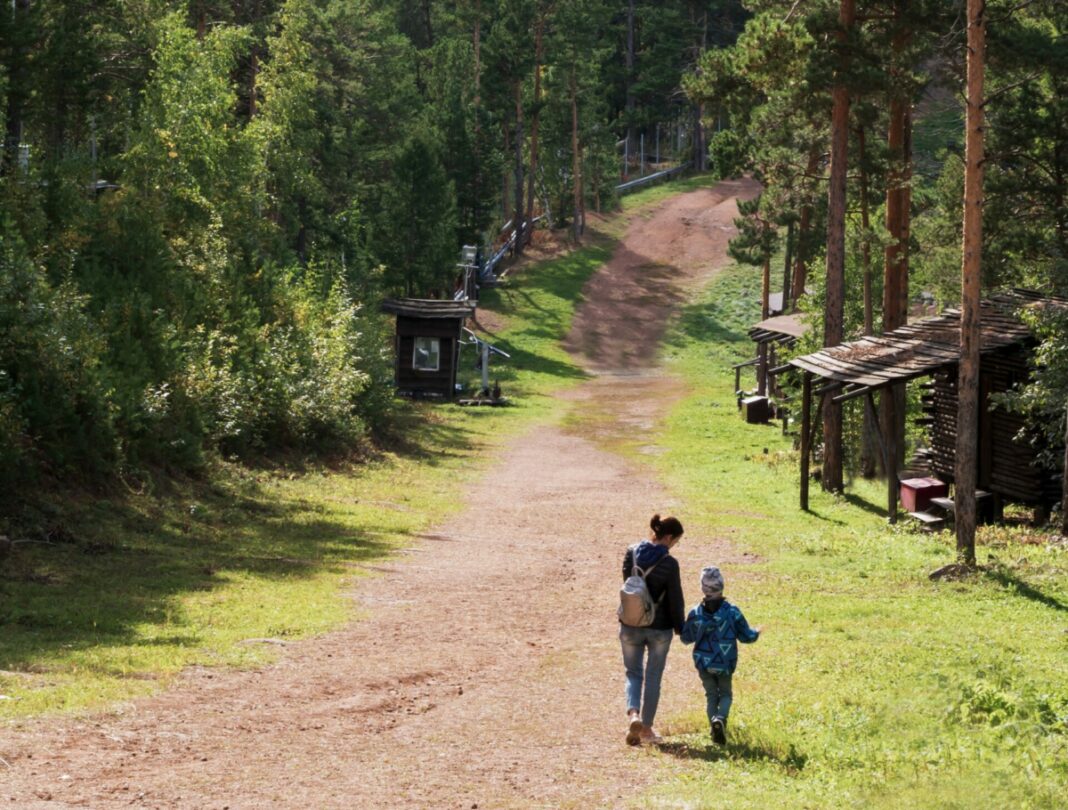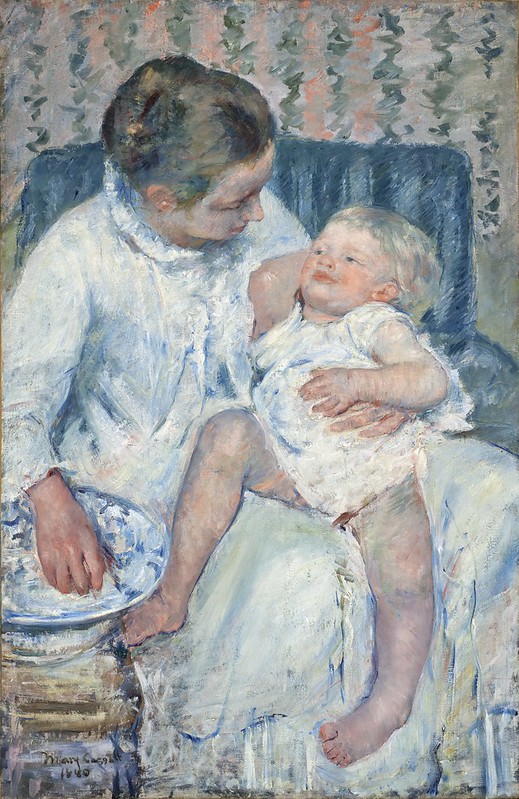Front Royal, VA. The other day I watched my preschooler climb atop a two-foot-tall rock on a lawn at our nearby National Park. There is a half-circle of these small boulders near one of the benches there, and my four children are familiar with every nook and cranny of each rock. As I looked on from the bench with an encouraging smile, my daughter jumped off, climbed back up, and jumped again.
Later that week, I watched as my kindergartener also took a jump. But he jumped, quite daringly and effectively, not from a rock but from the top of a jungle gym, four, perhaps even five feet from the ground. “Watch me!” he hollered, and then launched himself into the air.
Yikes.
“Wow, great job, Son!” said I, breathless and with racing heart. “That was a big jump, and you were able to do it! But don’t do it again for now. That jump is too risky, even though it worked out for you that time.”
These were, of course, two very different situations in terms of risk. The funny thing is, though, that in both cases, as soon as my child jumped I immediately found myself swirling in the very same instantaneous, familiar, and nerve-wracking process: trying to assess a risk to one of my children from several conflicting perspectives all at once, making a choice, and then hiding my nerves as best as I could with a deceitfully confident smile.
How draining.
Risk assessment is part of every parent’s job, but it can be one of the most difficult and emotionally unsettling parts. We make countless daily decisions in this area, whether small ones about whether (or not) to let quarreling siblings work things out independently or large ones about whether (or not) to leave an older child home alone during a brief errand.
The problem is that it is very difficult to make risk-related parenting decisions peacefully when we don’t have a reliable cultural baseline to fall back on. Every decision feels like a brand new one. Childhood, schooling, and family structures have changed so rapidly in the past forty years that it is now uncommon for men and women to parent with natural confidence, and each new stage brings its own anxieties and confusion. This is the truth at the center of the Mommy Wars: nobody knows just what to do, but we all know that what we do matters.
And so we make many of our parenting decisions with fear and trembling and are quick to reproach ourselves for our mistakes, even the minor ones. The exceptions to this rule of parental anxiety are many of our professional parenting experts, who shout at us from their blogs and books with such vehement overconfidence that it scares the rest of us half to death. Much of the advice and even the research on these matters is so contradictory and damning as to be practically useless.
Unfortunately, black-and-white thinking is very attractive to parents. We desperately want to know the magic formula for making sure our children turn out safe, good, and happy. But of course, deep down, we know no such formula is available.
The fact is that, as historian of American childhood Steven Mintz argues, if there is anything that has characterized American childhood overall across time, it is change: the essential instability of growing up. And although today’s parents read books and scour the internet and buy the latest gadgets in order to give their children the ultimate in safety and stability, a golden childhood is an elusive thing. Children are bullied; grandparents (and sometimes even parents or siblings) die; family members get sick or lose their jobs. Friends are mean. Hormones change. Growing up has always been, to some degree or another, a fraught process. Not even excellent parenting can completely prevent that.
And yet it is also true that American social anxiety about children has increased decade-by-decade since the early twentieth century, as Mintz notes. Parents have increasingly lost touch with confident cultural norms about parenting. This historical development has walked hand-in-hand, not coincidentally, with the professionalization of education and the development of the disciplines of psychology and sociology, whence come the parenting experts. The idea that good parenting can be discovered, established, codified, and measured has made us increasingly nervous that we will do it all wrong. It has also convinced us that we are responsible for our children’s outcomes in every area, negating any sense of the accidental or of our children as individual persons with their own free wills and life stories.
We parent now in a social context that blames the parents for anything and everything bad that happens to a child. We not only judge parents harshly when they leave a child unsupervised, for example, but we also make that moral judgment based on things like the parent’s sex or the reason the child was left alone rather than on the actual risk posed to the child.
Our culture is so focused on avoiding risk that risk assessment has turned into fear in ordinary American parenting. Because risk is always present, we find ourselves framing our choices in terms of how to prevent the worst from happening, choosing between bad and worse. And in the face of such concerns, we sometimes forget to consider also the possible benefits of the choices at hand.
And there lies a clue to one possible solution. There is indeed usually a risk, but there is also usually a benefit. It is not just poetry to note that “good timber does not grow with ease;” risk and growth really do have a way of binding themselves together. So we as parents might do better if we take a step back from trying to achieve expert-approved, risk-free perfection and consider the actual situation before us in light of both risks and benefits as calmly as possible. It is our responsibility to develop the interior muscle to evaluate risks and benefits with prudence rather than fear.
Take, for example, my two jumping children. Most parents would agree that children do need to climb and jump sometimes in order to develop agility and good judgment. But how do you tell when, at what age, how high, and in what context? Since we no longer have the sort of collective wisdom that once told us that “children should jump into haymows on the farm, but not off of moving horses,” it may be helpful to try to silence the external pressures we experience in these situations.
For there has never been a golden way of parenting. Parents have been more confident in their decisions at other points in American history (especially before 1920 or so), but their wisdom was fitted to those past contexts and can only go so far in informing us today. We can appreciate, but not replicate, their experiences. The same can be said for current research and experts; we can learn from them, but only to a point. After that, we’re on our own.
But that is essential to the work of parenting—to make the best judgments we can with our own God-given smarts until our children can make judgments for themselves. All of parenting is risky because nothing is more important to us than our children. And the decisions we make do matter, sometimes greatly. But if we allow risk to dominate our thinking and practices, we will become unmoored from reality and pass down this paralyzing anxiety to our children. And that is the last thing that any parent wants to do.













Kids are as responsible as they’re expected to be, I think. I was definitely a “free range kid” in my younger days. Hard to teach your kids to learn from mistakes if you won’t allow them circumstances that present an opportunity to make any. Ever read Anthony Esolen’s book “Out of the Ashes”? It contains some nice reflections on exactly these matters, and it is grist for the FPR mill, as well.
I think it’s been known for ages, or at least observed in regard to past civilizations like ancient Rome, that widespread prosperity leads to risk aversion. Then the aging civilization dies and is replaced by one where young people can exercise dynamism in ways that fit new circumstances.
I think it’s also true that experts honestly want to share their knowledge and some of it is beneficial. IMO the real problem is not the parenting guidebooks, but rather the moralistic disdain or even condemnation that those who dogmatically believe in experts impose on parents who are trying to find a balance between panic and freedom. This became even more evident during the pandemic with all of its contradictory regulations and fake experts, some of whom lied outright.
Overall, a great article on short-term decision-making. I also liked the long-term view in this segment: “our children as individual persons with their own free wills and life stories”. Indeed, one often gets the impression that a lot of parents nowadays view their kids as “projects” with “success” measured by college admission, salary, etc. of their kids as “proof” of the parents’ self-worth.
Comments are closed.